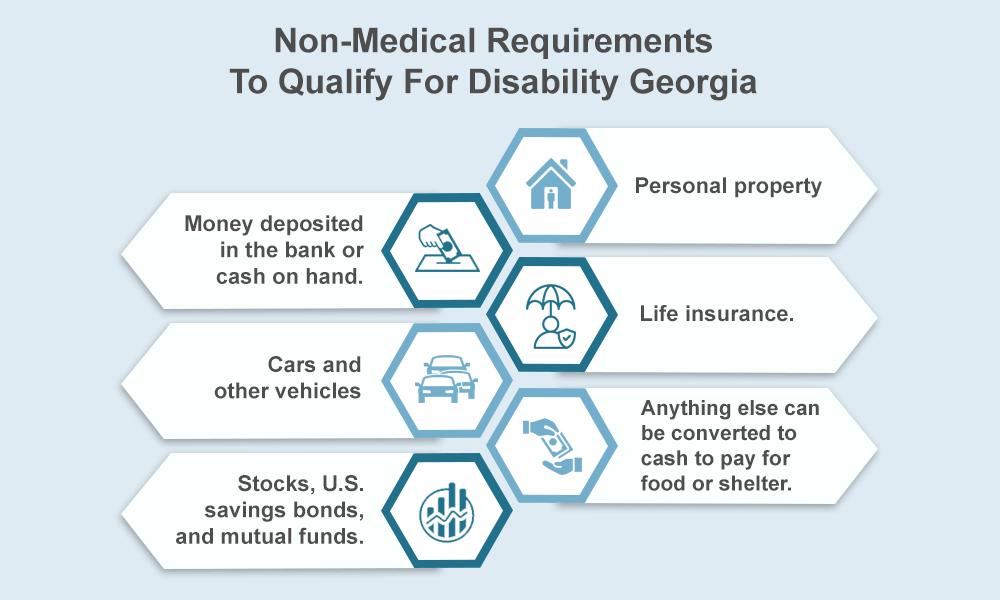
How To Qualify for Social Security Disability Benefits In Georgia
If a disabling medical condition prevents you from earning a living, help is available through the Social Security Disability Insurance (SSDI) and Supplemental Security Income (SSI) programs. In order to qualify for disability in Georgia through either of these programs, you need to be disabled according to the definition used by the Social Security Administration and meet non-medical requirements specific to each program.
Qualifying for Social Security disability benefits is not an easy task. Only about one-third of the people who submit claims each year successfully make it through the initial application process. Complex rules and regulations combine to make it difficult to qualify for disability benefits, but you should not give up.
This article explains how to qualify for disability through SSI and SSDI. It explains the medical and non-medical requirements you must satisfy to receive the financial help that Social Security disability benefits offer.
Non-Medical Requirements To Qualify For Disability Georgia
The SSDI program is funded by Social Security payroll taxes. In order to be “insured” and qualify for disability benefits, you must have a record of working at jobs or through self-employment with income subject to Social Security taxes. SSI, on the other hand, does not have a work requirement, but the amount of income and the value of resources available to you cannot exceed very low limits to qualify.
SSDI uses work credits to determine whether you worked long enough to qualify for benefits. For 2023, a credit is earned for each $1,640 that you have in wages or income through self-employment, and you can earn up to four work credits annually.
As a general rule, a disabled worker needs 40 work credits to qualify for benefits, but 20 of the credits must be earned within 10 years prior to being disabled. Workers who become disabled at a younger age may not need as many work credits to qualify for disability in Georgia, so get advice from an experienced disability lawyer who can review your work record and determine if you qualify.
The non-medical requirement to qualify for SSI focuses primarily on your income and resources because it is a need-based program with benefits intended to help beneficiaries with money to pay for food and shelter. Resources, which cannot have a total value exceeding $2,000 for an individual and $3,000 for married couples include the following:

Some resources may not count in determining whether you qualify for SSI. For example, the value of a vehicle you own that is used for personal transportation by you or a member of your household does not count against the resource limit. The same is true for the value of a home you own and the land it is situated on provided you occupy it as your principal residence.
There are other non-medical requirements to qualify for SSI. For example, you must be a U.S. citizen or a national owing allegiance to the U.S., such as a person born in American Samoa. You also must be a resident of the District of Columbia, one of the 50 states, or the Northern Mariana Islands.
Imprisonment may affect your ability to qualify or continue to receive SSI benefits if the confinement is for more than 30 days. You also cannot receive benefits if you are subject to arrest under an outstanding felony warrant.
Medical Requirements To Qualify For Disability In Georgia
The initial review of an application for SSI or SSDI focuses on the non-medical requirements to qualify for benefits. If your application meets them, it is sent to the Disability Determination Services, which is a state agency, for review of the medical claim.
An examiner goes through your application and any medical evidence submitted in support of it to determine if you are disabled according to the definition contained in federal regulations. You must be unable to do any substantial gainful activity as a result of a medically determinable physical or mental health impairment that lasted or is anticipated to last for at least 12 months or result in death.
The examiner may request copies of your medical records supporting the claim as necessary to determine whether you are disabled. You may be asked to undergo another medical examination to aid in the determination process.
Contact A Disability Benefits Lawyer
Improve your chance to qualify for disability benefits through SSI and SSDI by retaining the services of an experienced disability lawyer at the Keener Law Firm. Whether filing an initial application to qualify for disability in Georgia or appealing an unfavorable decision, a disability lawyer brings knowledge of the law and experience to fight to get you the disability benefits that you need and deserve. Contact us today for a free consultation.